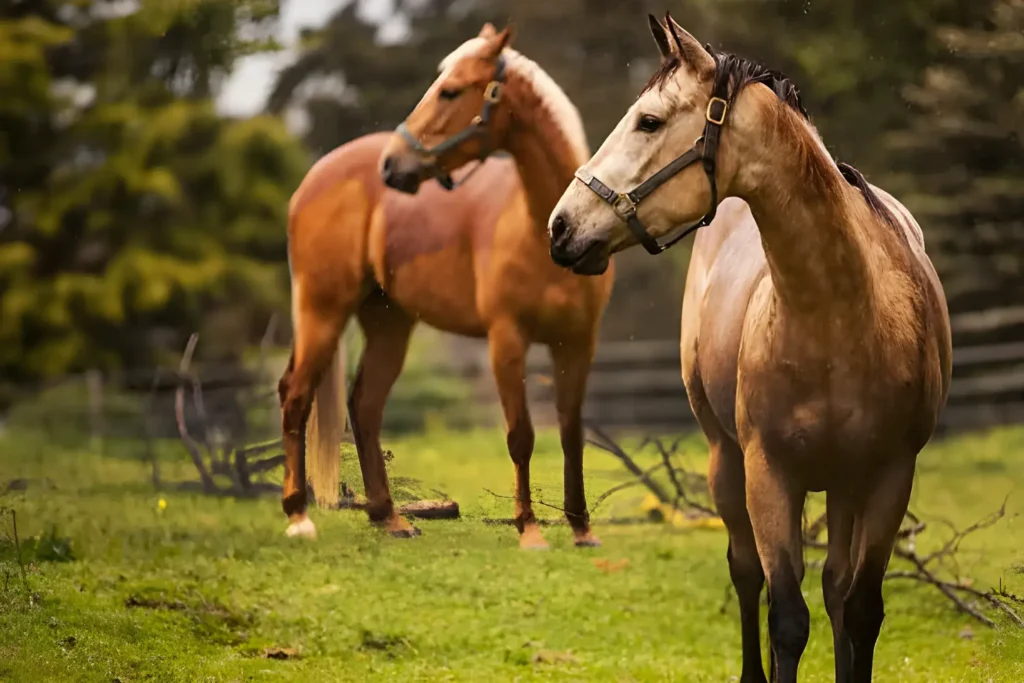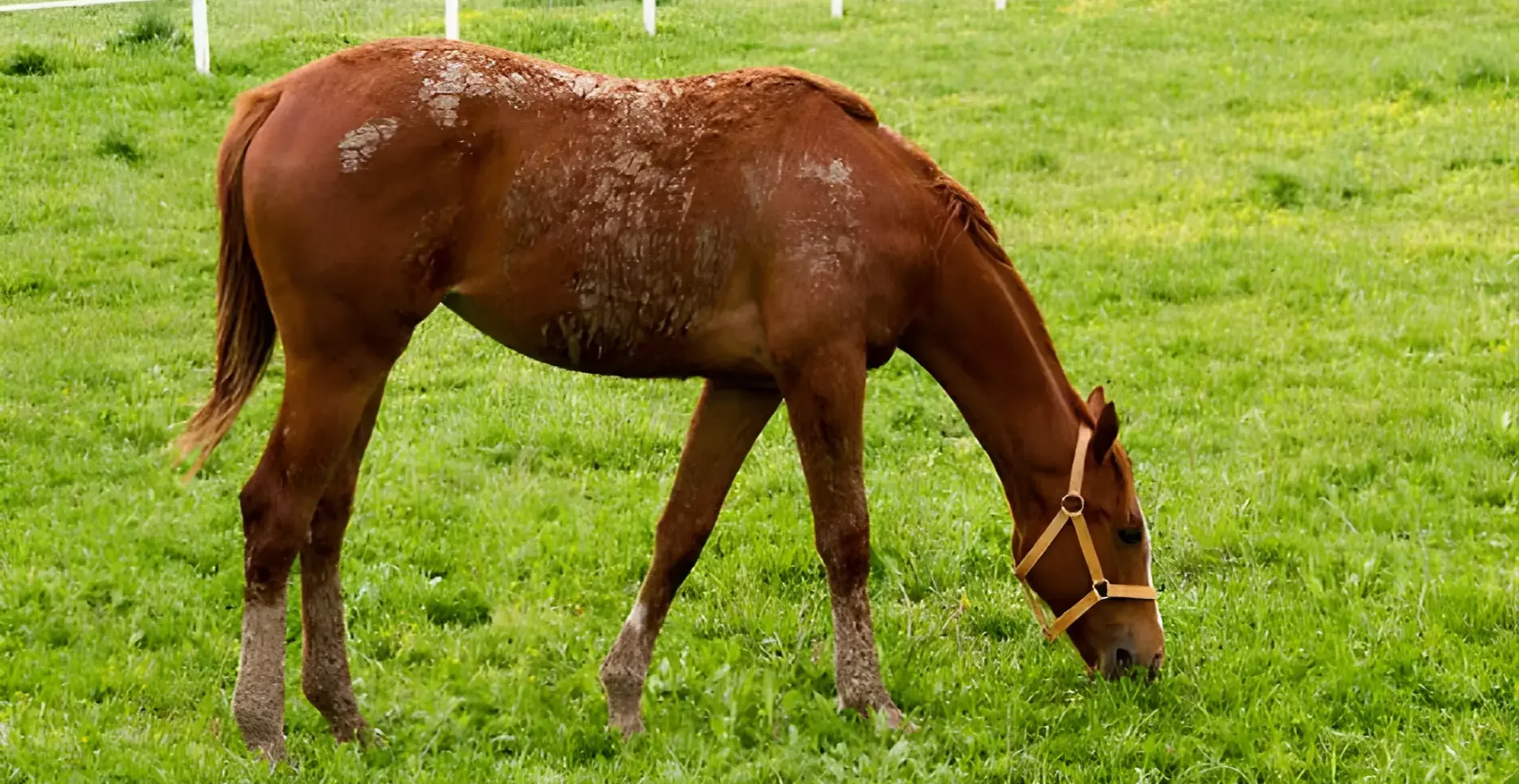Rain rot, also called dermatop`hilosis, is a common bacterial skin infection that flourishes in wet conditions. You’ll often see raised scabs and matted hair, which can be sore and itchy for your horse. Thankfully, with proper treatment and prevention, you can get your horse back to good health.
Understanding Rain Rot
The Culprit: Rain rot is caused by the bacteria Dermatophilus congolensis. These bacteria live on a horse’s skin but cause infection when skin is weakened by prolonged moisture.
Who’s at Risk: Any horse can get rain rot, but those with compromised immune systems, cuts or scrapes, or those who stay wet for extended periods are more susceptible.
Symptoms of Rain Rot
Scabby Bumps: Look for small, raised scabs that make the coat feel rough. These are most common on the back, rump, and neck.
Matted Hair: As the infection progresses, hair mats together over the scabs. When removed, they may reveal raw, irritated skin.
Pain and Itching: Your horse may be sensitive to touch in affected areas or rub them against fences.
Severe Cases: If untreated, lesions can spread, ooze pus, and may lead to fever and lethargy.
Treating Rain Rot: Step by Step
1. Soften & Remove Scabs:
- Gently soak the affected areas with warm water and a medicated shampoo (chlorhexidine or povidone-iodine are common choices).
- Avoid harsh scrubbing. Allow scabs to soften and remove the loose ones.
2. Cleanse the Wounds:
- Prepare a dilute solution of chlorhexidine or povidone-iodine according to the product’s directions.
- Gently bathe the area to clean away dirt and debris. Rinse thoroughly.
3. Drying is Key:
- Thoroughly dry the affected areas with clean towels. Promoting a dry environment is crucial for healing.
4. Topical Treatments:
- Consult your veterinarian for appropriate topical medications. These may include antibiotic or antifungal ointments or sprays.
- Apply as directed, often for several days.
5. Severe Cases:
- For widespread infections or systemic symptoms, your veterinarian may prescribe oral antibiotics.
Prevention is the Best Medicine

Keep Your Horse Dry: Provide shelter from rain and ensure blankets aren’t causing excessive sweating.
Treat Wounds Promptly: Clean even minor cuts to prevent secondary infections.
Boost Immunity: A balanced diet and reduced stress support a strong immune system.
Fly Control: Flies can spread the bacteria, so good fly control is essential.
Myths and Misconceptions
Myth: Rain rot is caused by rain itself.
- Fact: Rain creates conditions that allow the bacteria to thrive.
Myth: All horses with scabs have rain rot.
- Fact: Similar symptoms can result from fungal infections, allergies, etc.
Myth: Rain rot can be prevented by over-bathing.
- Fact: Excessive bathing can disrupt the skin’s natural protective barrier.
When to Call the Vet
- The lesions are extensive.
- Home treatment shows no improvement after a few days.
- Your horse exhibits a fever, lethargy, or loss of appetite.
- Rain rot becomes a recurring problem.
Beyond Treatment: Environmental Management
- Turnout: Limit turnout during wet weather. Consider a dry lot if pastures are muddy.
- Blanketing: Use breathable blankets and remove them if the horse sweats.
- Grooming: Clean grooming tools regularly to prevent the spread of bacteria.
Additional Considerations
- Sensitive Areas: Use diluted solutions and gentle techniques on the face and ears.
- Chronic Cases: Recurrent rain rot may necessitate underlying health issue investigations.
- Isolation: Temporarily isolate infected horses to prevent spread.
Conclusion
Rain rot can be frustrating, but with proper treatment, prevention, and attention to your horse’s overall health, you’ll restore comfort and banish those troublesome scabs.
The photo featured below the post headline is Credit: ElrondPeredhil/istockphoto
I hope you find this post helpful and informative. If Yes’ feel free to share it with your friends!
Frequently Asked Question
Is rain rot contagious to other horses?
Yes, rain rot is contagious. It’s best to isolate infected horses to prevent spread.
Is rain rot contagious to humans?
Yes, but less common. People with weakened immune systems are more susceptible. Practice good hygiene around infected horses.
How long does it take for rain rot to heal?
Healing time varies. Mild cases may clear in two weeks, while severe cases or those in damp environments may take longer.
Should I pick the scabs off my horse with rain rot?
No. Allow scabs to soften with warm water and gentle soaking, then remove only the very loose ones.
How can I tell the difference between rain rot and ringworm?
Both can cause scabs, but ringworm lesions are often circular. Consult your veterinarian for accurate diagnosis.
Can rain rot cause permanent hair loss?
Usually not. Hair usually regrows fully, but severe infections may occasionally lead to scarring and hair loss.
Will my horse get rain rot again?
Horses prone to rain rot may experience recurrences, especially in wet conditions. Prevention is key.
My horse keeps getting rain rot, what can I do?
Discuss this with your veterinarian to investigate underlying health issues or immune deficiencies.
Does rain rot go away on its own?
Very mild cases may resolve on their own, but treatment usually speeds healing and reduces the risk of spreading.
What is the fastest way to cure rain rot?
A combination of appropriate treatment, a dry environment, and potentially vet-prescribed medication is usually the fastest path to recovery.
Can I put Vaseline on rain rot?
No. Vaseline traps moisture and can make the infection worse.
Can I ride my horse with rain rot?
It depends on the severity. If the lesions are under saddle or girth areas, it’s best to rest your horse until healed.
What’s the best shampoo for rain rot in horses?
Veterinarian-recommended medicated shampoos containing chlorhexidine or povidone-iodine are effective.

